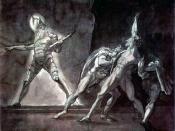Role of Evil in Hamlet's Delay and Downfall
Scholarly critics have long regarded William Shakespeare's seventeenth-century tragedy, Hamlet, as perhaps the single greatest piece of English literature ever produced. In his Shakespeare: The Invention of the Human, Harold Bloom calls the phenomenon of Hamlet's character "unsurpassed in the West's imaginative literature" (384), and the play itself "the Mona Lisa of literature" (391). Written almost entirely in iambic pentameter, Hamlet's flowing poetic rhythm, utilized in conjunction with deeper thematic elements and outstanding character depth (particularly Hamlet's), separates itself from virtually all other works. The play's many adaptations--put to use through most all forms of modern media including television, motion picture, and theater--in addition to its new critical interpretations written in context of the modern world, continually stir up fierce debate and captivate audiences throughout the world. Criticism of the renowned tragedy of Hamlet stems far beyond straightforward, fundamental thinking, and delves deeper into the heart of the play, in search of more profound meaning within every aspect, albeit large or very small.
One particular facet of the tragedy that is subject to seemingly endless dispute among critics is that of Prince Hamlet's delay in murdering his uncle and the current king of Denmark, Claudius. Scholars propose numerous reasons for his delay, ranging from conservatives ones like his inability to judge falsehood from reality, to far-reaching ideas such as that Hamlet suffers from clinical depression, or even an Oedipal complex in which the desire for his mother causes Hamlet's delay. However a critical function of the play revolves around Hamlet's confrontation with the supposed ghost of his father, his delay, transformation, and its subsequent calamitous results. Hamlet's indecisiveness, his haunting soliloquies concerning heaven, hell, suicide, and life after death, and his description of the 'potent poison' each serve as examples of central...



Not clear
This essay pretty much tells the audience about Hamlet but does not provide much evidence and the thesis is not strong why" Hamlet " is evil.
1 out of 1 people found this comment useful.